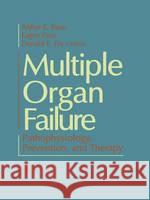Multiple Organ Failure: Pathophysiology, Prevention, and Therapy » książka
Multiple Organ Failure: Pathophysiology, Prevention, and Therapy
ISBN-13: 9780387987330 / Angielski / Twarda / 2000 / 712 str.
Inflammation in itself is not to be considered as a disease . . . and in disease, where it can alter the diseased mode of action, it likewise leads to a cure; but where it cannot accomplish that solitary purpose . . . it does mischief - John Hunter, A Treatise on the Blood, ITfIlammation, and Gunshot Woundr (London, 1794)1 As we reached the millennium, we recognized the gap between our scientific knowledge of biologic processes and our more limited clinical capabilities in the care of patients. Our science is strong. Molecular biology is powerful, but our therapy to help patients is weaker and more limited. For this reason, this book focuses on the problems of multiple organ failure (MOF), multiple organ dysfunction syndrome (MODS), and systemic inflammatory response syndrome is, patients who have severe injuries; require major, (SIRS) in high-risk patients, that overwhelming operations; or have serious illnesses requiring intensive care; patients who have diseases elsewhere, in other organs or systems, that limit their capabilities to survive a new insult; and patients who are elderly or at high risk for sepsis or other complications. These are the patients who need our help. They need the advances in science, in molecular biology, immunology, pathophysiology, biochemistry, genetics, high technology, and other areas of maximum support at the bedside. These advances could potentially have the greatest impact on improving patient care.











